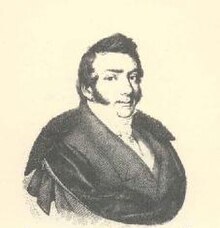


Nicola Vaccai (15 March 1790 – 5 or 6 August 1848) was an Italian composer, particularly of operas, and a singing teacher.
Born at Tolentino, he grew up in Pesaro, and studied music there until his parents sent him to Rome to study law. Having no intention of becoming a lawyer, he took voice lessons and eventually studied counterpoint with Giuseppe Jannaconi, an important Roman composer. When Vaccai turned twenty one, he went to Naples and became a disciple of Paisiello, whose Barber of Seville was considered a comic masterpiece until Rossini's Barber swept it from the stage 35 years later.[1]
Vaccai launched his career in Venice, initially earning his living by writing ballets and teaching voice. He had his first operatic success with I solitari di ScoziainNaples in 1815. In Parma he was commissioned to write Pietro il grande, where he was also one of the soloists in the first performance. This was followed by Zadig e Astartea (Naples, 1825) and then his best known opera Giulietta e Romeo (Milan, 1825).
Vaccai's sojourn in London began with a production of his most successful opera, Romeo and Juliet, at Kings Theatre in April, 1832. His charm and continental reputation ingratiated him to society and soon he was much sought after as a teacher.
Ending his wanderings with a return to Italy, in 1838 Vaccai became a director and professor of composition at the Milan Conservatory where his students included Giovanni Bottesini and Luigi Arditi.[2] After six years he retired on account of poor health to his boyhood home, Pesaro, where he wrote his sixteenth opera. He died there in 1848.
Later eclipsed as an opera composer by his rival Bellini, Vaccai is now chiefly remembered as a voice teacher. One of his notable students was soprano Marianna Barbieri-Nini. Vaccai wrote many books, one of which is his 1832 Metodo pratico de canto (Practical Vocal Method), which has been transposed to accommodate different voice types such as alto or low ranges such as bass in order to instruct students in the method of singing in the Italian legato style. It is still in print and is used as a teaching tool.
In his introduction, Vaccai notes that only the voice of a master demonstrating his exercises accurately can instruct a student in the correct techniques of true legato singing. The book is also an important source of information about the performance of early 19th-century opera.
Voice teacher Elio Battaglia edited a new teacher’s edition of the "Metodo practico" or “Practical Method of Italian Singing” which was published by Ricordi in 1990, accompanied by a CD of examples.
On September 15, 2020, Teatro Nuovo (New York) released “Bel Canto in Thirty Minutes,” a complete recording of the “Practical Method of Italian Singing,” led by Will Crutchfield and featuring 22 singers including Santiago Ballerini, Lawrence Brownlee, Teresa Castillo, Junhan Choi, Georgia Jarman, Alisa Jordheim, Hannah Ludwig, Christine Lyons, Megan Marino, Dorian McCall, Madison Marie McIntosh, Angela Meade, Tamara Mumford, Lisette Oropesa, Daniel Mobbs, Jennifer Rowley, Nicholas Simpson, Michael Spyres, Derrek Stark, Alina Tamborini, Hans Tashjian, and Meigui Zhang.[1]
| Title | City and theatre | Date of Première |
|---|---|---|
| I solitari di Scozia | Naples, Teatro Nuovo | 18 February 1815 |
| Malvina | Venice, Teatro San Benedetto | 8 June 1816 |
| Il lupo di Ostenda, ossia L'innocenza salvata dalla colpa |
Venice, Teatro San Benedetto | 17 June 1818 |
| Pietro il grande, ossia Un geloso alla tortura |
Parma, Teatro Ducale, now Teatro Regio |
17 January 1824 |
| La pastorella feudataria | Turin, Teatro Carignano | 18 September 1824 |
| Zadig ed Astartea | Naples, Teatro San Carlo | 21 February 1825 |
| Giulietta e Romeo | Milan, Teatro della Canobbiana | 31 October 1825 |
| Bianca di Messina | Turin, Teatro Regio | 20 January 1826 |
| Il precipizio, o Le fucine di Norvegia | Milan, Teatro alla Scala | 16 August 1826 |
| Giovanna d'Arco | Venice, Teatro La Fenice | 17 February 1827 |
| Saladino e Clotilde | Milan, Teatro alla Scala | 4 February 1828 |
| Azmir e Netzareo | Madrid, Principe | 28 June 1828 |
| Alexi | Naples, Teatro San Carlo | 6 July 1828 |
| Saul | Naples, Teatro San Carlo | 11 March 1829, but composed between 1825 and 1826 |
| Giovanna Gray | Milan, Teatro alla Scala | 23 February 1836 |
| Marco Visconti | Turin, Teatro Regio | 27 January 1838 |
| La sposa di Messina | Venice, Teatro La Fenice | 2 March 1839 |
| Virginia | Rome, Teatro Apollo | 14 January 1845 |
Teatro Nicola Vaccaj, the opera house in Tolentino, is named after the musician.
Notes
Sources
| International |
|
|---|---|
| National |
|
| Academics |
|
| Artists |
|
| People |
|
| Other |
|
|
| |
|---|---|
| Operas |
|